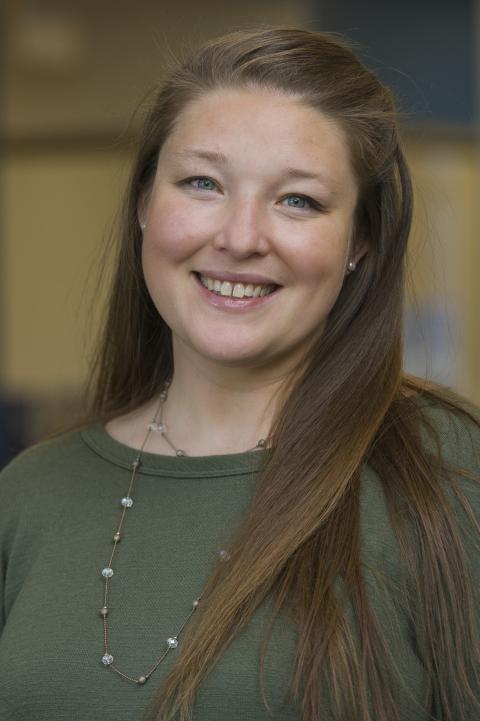
“I could go to school forever, there are so many things I want to know,” declares Clarissa Michalak, Clinical Assistant Professor with the Nursing Department at UNH.
Clarissa’s lifelong passion for learning is evidenced by an impressive list of academic accomplishments. In 2007, she earned a bachelor’s degree in nursing science from the University of Maine, completing an Honor’s College thesis to evaluate student perceptions of senior nursing care and its inclusion in the undergraduate curriculum.
With a wealth of experience in the field of nursing, Clarissa started her career with the Johns Hopkins Hospital System while she earned a degree from Towson University and worked as a clinical instructor of undergraduate nursing students. During clinical rotations, she realized she was instructing students using policies and protocols from only one institution, which led her to seek out additional experiences as a travel critical care nurse practitioner in Washington, DC, New Hampshire, Texas, and New York City.
Inspired by a desire for greater autonomy and expansion of her skills, Michalak completed a post-master’s certificate as an Adult-Gerontology Acute Care Nurse Practitioner at the University of Massachusetts Medical School. She returned to New York as a nurse practitioner within critical care at New York University Langone Medical Center, then earned a Doctorate of Nursing Practice from New York University where she completed a quality improvement project evaluating the role of human factor engineering on central line bloodstream infections in the Medical Intensive Care Unit. She also taught DNP courses at NYU before joining the UNH Nursing Department in 2020, as a Clinical Assistant Professor.
Clarissa has done volunteer work with health-related organizations, including the Alzheimer’s Association and National Psoriasis Foundation. Her unique skills as a healthcare provider were invaluable as the Research Ambassador with the National Psoriasis Foundation. In this role, she met with psoriatic disease researchers to translate their studies from “the bench” to the “bedside” by sharing their findings with the psoriatic disease community.
Identifying a knowledge gap in many nurse practitioner curriculums regarding autoimmune and rheumatological diseases, Michalak set herself the goal of improving provider instruction. She has presented multiple posters on rheumatology at national conferences, including the Society of Hospital Medicine and Rheumatology Nurses Society, and she has presented about the psoriatic disease at both state and national nurse practitioner conferences.
Mindful of the need for ongoing self-education, Michalak feels a professional obligation to offer her skills to the nursing community. She has been a preceptor for student nurses and nurse practitioners and, in her nurse practitioner role at NYU, she oriented new hires and new graduates. But Clarissa expresses deep concern about the growing national shortage of nurses and educators. With many experienced professionals now in their 50s and 60s, the pandemic has accelerated the pace of retirement, which also decreases the available pool of skilled educators.
“My response to the national shortage of nurses is to become an educator. I want to lead by example by contributing to the high nursing standards that keep the force strong.”
Clarissa’s goal in education is to help nurse practitioners remain current on new practices but she understands that access to continuing education can be a challenge for students balancing study with work and home life. To bridge that gap, she has created a new UNH Online nursing program targeted for fall 2020: Post-Master’s Adult-Gerontology Acute Care Nurse Practitioner Certificate. This fully online program includes 500 clinical preceptor hours in the student’s home state and prepares graduates to sit for their certification by AACN or ANCC.
“Every student brings their own nursing experience to the program but they will need to ‘forget’ some things they have learned from clinical experiences to absorb the latest guidelines in the field of acute care. I will learn as much from them as they will learn from me.”
As an acute care nurse practitioner at NYU Langone Health, Clarissa witnessed first-hand the devastation of the city’s first wave of COVID-19 in spring 2020. The pandemic quickly invaded the city, imposing a heavy demand on every person in the medical community to work endless hours, manage exposure protection with minimal supplies, and become deeply acquainted with a tidal wave of death and suffering at an unprecedented level.
“I hope the experience in NYC during the spring of 2020 generates greater respect for the nursing profession. I watched nurses stretch beyond their training to adapt and encompass far-ranging needs. Their ability to learn and quickly transition to expanding needs birthed an incredible level of teamwork and peer coaching that should be recognized and applauded.”
Michalak notes that nurses are often agents of change because of daily observation of bedside issues. Adept at translating medical terminology for patients and families, nurses help guide them through a confusing array of clinical events. The multi-faceted role of the nurse as a communication hub between patients, doctors, and families represents an often unrecognized but extraordinarily important hallmark of their profession.
The overload of the pandemic has opened the door wider to another reality – healthcare providers are human beings who sometimes make mistakes. Michalak thinks back to a professor at UMass who taught her students that anyone can make a mistake. But rather focus on the incident, she taught them to focus on improving the system to catch errors before they happen. Clarissa encourages her students to always ask two critical questions: What is the root cause? How do we prevent this from happening again?
To survive and thrive in their field, nurses must develop their sweet spot of self-care and maintain their own wellbeing. To quote her mentor, “become better but remain humble.”
Written by Gwendolyn Goguelet